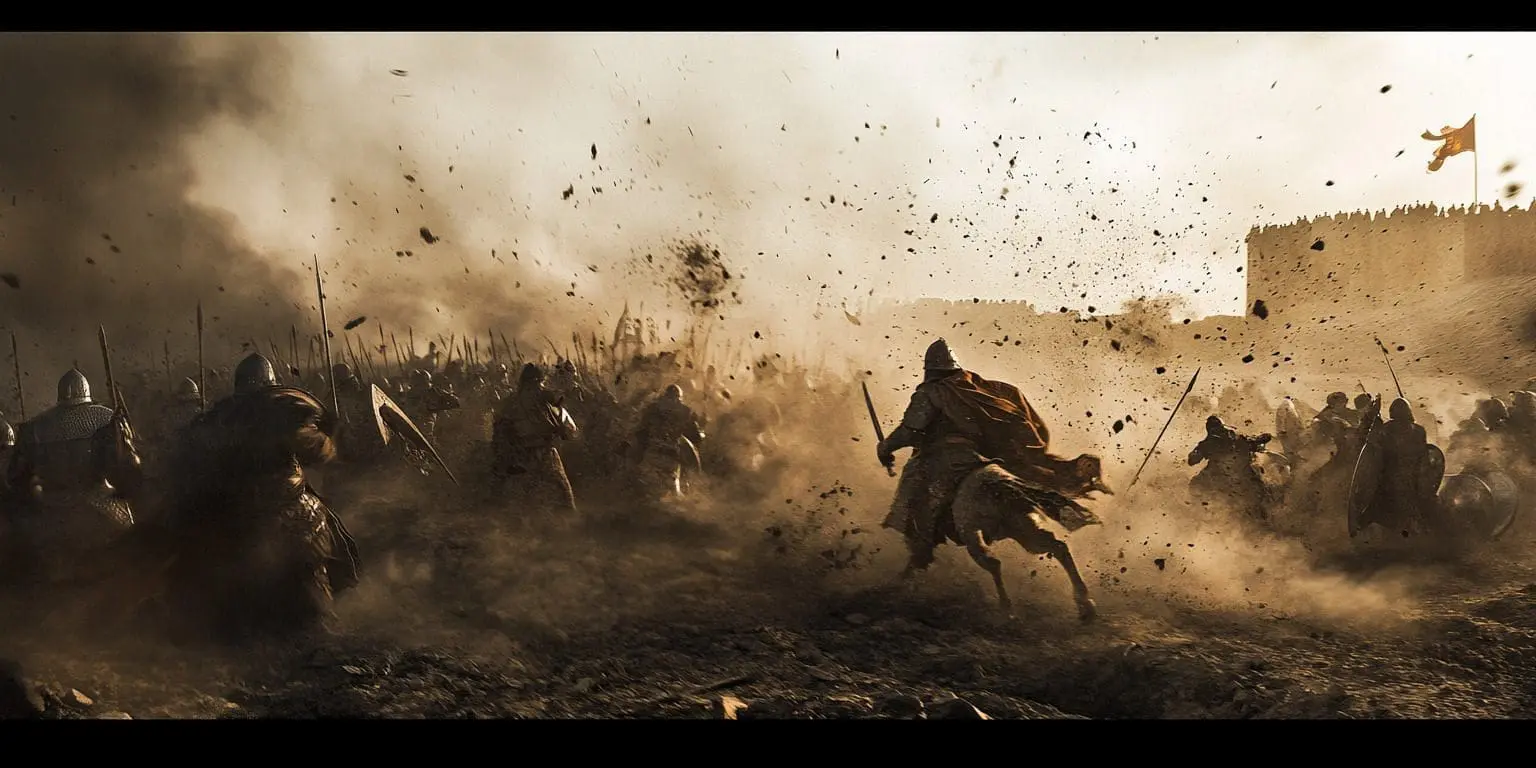Your basket is currently empty!

The Crusades
The Major Crusades Timeline
The Crusades were a series of religious and military campaigns initiated by the Latin Church during the medieval period. These expeditions were primarily aimed at reclaiming Jerusalem and other holy sites from Muslim control. Here’s a timeline at each of the major Crusades:
The First Crusade (1096-1099)
Initiated by Pope Urban II at the Council of Clermont in 1095, in response to a call for help from the Byzantine Emperor Alexios I, who was facing Turkish advances. The goal was to reclaim Jerusalem and assist the Byzantines.
The Second Crusade (1147-1149)
Prompted by the fall of the County of Edessa to the Seljuk Turks in 1144, the Second Crusade was called by Pope Eugene III. It was led by King Louis VII of France and Emperor Conrad III of Germany.
The Third Crusade (1189-1192)
Triggered by the capture of Jerusalem by the Muslim leader Saladin in 1187, the Third Crusade was launched to reclaim the city.
The Fourth Crusade (1202-1204)
Initially intended to reclaim Jerusalem, the Crusade was diverted to Constantinople due to political and economic motives, influenced by the Venetians.
The Fifth Crusade (1217-1221)
Aimed at conquering Egypt, seen as the key to controlling the Holy Land.
The Sixth Crusade (1228-1229)
Led by Emperor Frederick II of the Holy Roman Empire, who negotiated a peaceful transfer of Jerusalem to Christian control.
The Seventh Crusade (1248-1254)
Led by King Louis IX of France, this Crusade focused again on Egypt.
The Eighth Crusade (1270)
Also led by Louis IX, this Crusade targeted Tunis in North Africa.
Why were the Crusades fought?
One of the primary motivations for the Crusaders was the belief that they were fulfilling a divine mandate. Pope Urban II, in his call to arms at the Council of Clermont in 1095, framed the Crusades as a holy mission to reclaim Jerusalem and the Holy Land from Muslim control. For the Crusaders, this wasn’t just a military campaign but a spiritual journey. They believed that by participating, they were defending Christianity, protecting sacred sites, and aiding their fellow Christians in the East.
Many Crusaders saw their involvement as a path to salvation. The Church promised indulgences—remission of sins—for those who took part. The idea that fighting for such a holy cause could ensure a place in heaven was a powerful motivator.
Crusaders saw themselves as protectors of the faith. Jerusalem and other Christian holy sites in the Holy Land had great religious significance, and their capture by Muslim forces was seen as an affront to Christianity. In addition, reports of Christian pilgrims being harassed or even attacked while journeying to these sacred places fueled the sense that it was their duty to intervene.
For many, the Crusades were viewed as a defensive war, a necessary response to the perceived encroachment of Muslim forces into Christian territories.
Honour and Chivalry
In the medieval world, concepts of honour and chivalry were deeply important, particularly among the knightly class. The Crusades provided an opportunity for knights to demonstrate their bravery, martial prowess, and loyalty to the Church. The notion of going on a Crusade was closely tied to the ideals of knighthood—protecting the innocent, defending Christendom, and proving one’s worth on the battlefield.
Many knights believed that they could achieve lasting honour by participating in the Crusades, earning recognition both on earth and in heaven.
Restoring Christian Lands
From the Crusaders’ perspective, the Holy Land had originally been Christian territory, and they believed they were rightfully reclaiming lands that had been taken by Muslim forces. They saw this as rectifying past wrongs and restoring the Christian world to its former state of glory.
Many also saw the Byzantine Empire, which had requested aid from the West, as a fellow Christian power that needed support against Muslim armies. By aiding their Eastern brethren, Crusaders believed they were strengthening the overall Christian world.
Adventure and Opportunity
For some, particularly younger sons of nobles who stood to inherit little, the Crusades offered the chance for adventure, wealth, and land. The Crusades took knights and soldiers into exotic lands they had only heard about, offering the allure of distant adventures. The possibility of acquiring land or wealth in the newly established Crusader states was also a tempting prospect for many.
While religious motivations were paramount for most, personal gain and the desire for excitement certainly played a role in why some Crusaders believed their mission was worthwhile.
Unity of Christendom
The Crusades were also seen as a means to unify Christendom under a common cause. Pope Urban II had hoped that by calling the Crusades, he could unite the often-warring European states under a single banner. The idea of rallying knights, nobles, and peasants from across Europe to work together to defend Christianity was appealing to many, fostering a sense of shared identity and purpose.
Moral and Civilizational Superiority
Many Crusaders believed they were fighting for a superior, divinely sanctioned way of life. The medieval Christian worldview often regarded non-Christians as “infidels,” and many Crusaders saw their mission as bringing God’s truth to those who had been led astray or who did not yet know the “correct” path.
This sense of moral righteousness gave many Crusaders the conviction that their actions, even violent ones, were justifiable and sanctioned by God.
Long-term Consequences
In the long run, the Crusades did not achieve their ultimate objective of securing Christian control over the Holy Land. By 1291, the last Crusader stronghold, Acre, fell to the Mamluks, marking the end of Crusader rule in the region. The Holy Land remained under Muslim control thereafter.
Discover more from Histories and Castles
Subscribe to get the latest posts sent to your email.











